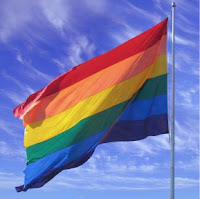Riding BART from San Francisco celebrating a friend’s 80th birthday, I came across a poster that read: “Queer Joy is Resistance.” Indeed, joy is resilience and resistance in the face of repression.
It recalled Gay Day 1983 when 500 of us men were in Santa Rita Jail (500 women in another part) for blocking Livermore Nuclear Labs on International Day of Nuclear Disarmament that Summer Solstice. We reddened our cheeks with cranberry or strawberry juice, blackened brows with used matches, stuffed our shirts with balls of wadded newspaper, fashioned skirts from newspaper, played makeshift instruments of empty plastic water jugs and bottles, and marched in the courtyard led by a friend who had been arrested wearing a full wedding dress (he afterwards changed his name to Dress Wedding.) Dan Ellsberg, David Hartsough, and Fr. Louis Vitale were with us. The prison guards surrounded us, grim and scowling, many obviously stifling grins and laughter.
It is interesting that “queer”, meaning odd or strange, has been derogatorily applied to folks of sexuality and gender outside the norm, and is now proudly claimed. And also that the Middle English word “gay,” meaning joyful, was applied to homosexual folk in the mid 1950s and now is also happily and proudly claimed.
Given the Abrahamic patriarchy on steroids of the fascism that governs us and denies women freedom of their own bodies and persecutes those of variant sexual and gender identities, we must laugh our joy in the face of dour puritanism, prejudice, fear, and cruelty.
It is interesting that “queer”, meaning odd or strange, has been derogatorily applied to folks of sexuality and gender outside the norm, and is now proudly claimed. And also that the Middle English word “gay,” meaning joyful, was applied to homosexual folk in the mid 1950s and now is also happily and proudly claimed.
Given the Abrahamic patriarchy on steroids of the fascism that governs us and denies women freedom of their own bodies and persecutes those of variant sexual and gender identities, we must laugh our joy in the face of dour puritanism, prejudice, fear, and cruelty.
To all our brothers and sisters who this month celebrate the Stonewall Riots and human sexuality in all its diversity and joy with provocative abandon and scandalous good humor. (And in these fascist times, with justifiable fear and anger.) Joy is our resistance and humor deflates tyrants. So let us all sing this cheerful little ditty:
Little Sex Song
We have a ding
or we have a dong;
at various times
& different places
We may play ding-ding
and of course ding-dong
and we may play dong-dong.
Anyway, the music is lovely
& we can’t go wrong.
We have a ding
or we have a dong;
at various times
& different places
We may play ding-ding
and of course ding-dong
and we may play dong-dong.
Anyway, the music is lovely
& we can’t go wrong.
© Rafael Jesús González 2025

Tomando BART de San Francisco después de celebrar el 80.º cumpleaños de un amigo, me encontré con un cartel que decía: “La alegría queer es resistencia.” De hecho, la alegría es resiliencia y resistencia frente a la represión.
Me recordó el Día Gay de 1983, cuando 500 hombres estábamos en la cárcel de Santa Rita (500 mujeres en otra parte) por bloquear los Laboratorios Nucleares de Livermore el Día Internacional del Desarme Nuclear ese solsticio de verano. Nos pintamos las mejillas con jugo de arándano o fresa, nos pintamos las cejas con cerillos usados, rellenamos nuestras camisas con bolas de papel de periódico, hicimos faldas con papel de periódico, improvisamos instrumentos con jarras y botellas de agua pláticas vacías, y marchamos por el patio encabezados por un amigo que había sido arrestado con un vestido de novia (que luego cambió su nombre a Dress Wedding). Dan Ellsberg, David Hartsough y el padre Louis Vitale nos acompañaban. Los guardias de la prisión nos rodeaban, duros y frunciendo, muchos de ellos obviamente reprimiendo sonrisitas y risa.
Es interesante que «queer», que significa raro o extraño, se haya aplicado de forma despectiva a personas de sexualidad y género fuera de norma, y ahora se reclama con orgullo. Y también que la palabra del inglés medio «gay», que significa alegre, se aplicara a las personas homosexuales a mediados de los 1950s y ahora también se reclama con alegría y orgullo.
Dado el patriarcado abrahámico en esteroides del fascismo que nos gobierna, niega a las mujeres la libertad de sus propios cuerpos y persigue a quienes tengan identidades sexuales y de género variables, debemos reír nuestra alegría en la cara del severo puritanismo, prejuicio, miedo y crueldad.
Es interesante que «queer», que significa raro o extraño, se haya aplicado de forma despectiva a personas de sexualidad y género fuera de norma, y ahora se reclama con orgullo. Y también que la palabra del inglés medio «gay», que significa alegre, se aplicara a las personas homosexuales a mediados de los 1950s y ahora también se reclama con alegría y orgullo.
Dado el patriarcado abrahámico en esteroides del fascismo que nos gobierna, niega a las mujeres la libertad de sus propios cuerpos y persigue a quienes tengan identidades sexuales y de género variables, debemos reír nuestra alegría en la cara del severo puritanismo, prejuicio, miedo y crueldad.
A nuestros hermanos y hermanas que en este mes celebran los disturbios de Stonewall y la sexualidad humana en toda su diversidad y alegría con provocante abandono y escandaloso buen humor. (Y en estos tiempos fascistas con justificable temor y furia.) La alegría es nuestra resistencia y el humor desinfla a tiranos. Así que cantemos todos esta alegre cancioncita:
Cancioncita del sexo
Tenemos una doña
o tenemos un don;
en varias veces
y distintos lugares
podemos tocar doña-doña
y por supuesto doña-don
y podemos tocar don-don.
De todos modos la música es linda
y no necesitamos perdón.
© Rafael Jesús González 2025
 -
-


No comments:
Post a Comment